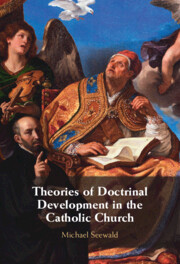Book contents
- Theories of Doctrinal Development in the Catholic Church
- Theories of Doctrinal Development in the Catholic Church
- Copyright page
- Contents
- Acknowledgements
- Introduction: What Is This Book About?
- 1 Defining Dogma and Development
- 2 The Bible: Both Product and Yardstick of Doctrinal Development
- 3 How the Early Church Reflected on Doctrinal Continuity and Change
- 4 Discussions in the Middle Ages on Changes to the Unchanging Faith
- 5 Theories of Doctrinal Development in the Nineteenth and Early Twentieth Century
- 6 The Twentieth Century: From Anti-Modernism to the Second Vatican Council
- 7 Overview and Outlook
- Epilogue: An ‘Obituary’ to the Church?
- Bibliography
- Index
3 - How the Early Church Reflected on Doctrinal Continuity and Change
Published online by Cambridge University Press: 18 February 2023
- Theories of Doctrinal Development in the Catholic Church
- Theories of Doctrinal Development in the Catholic Church
- Copyright page
- Contents
- Acknowledgements
- Introduction: What Is This Book About?
- 1 Defining Dogma and Development
- 2 The Bible: Both Product and Yardstick of Doctrinal Development
- 3 How the Early Church Reflected on Doctrinal Continuity and Change
- 4 Discussions in the Middle Ages on Changes to the Unchanging Faith
- 5 Theories of Doctrinal Development in the Nineteenth and Early Twentieth Century
- 6 The Twentieth Century: From Anti-Modernism to the Second Vatican Council
- 7 Overview and Outlook
- Epilogue: An ‘Obituary’ to the Church?
- Bibliography
- Index
Summary
‘As fundamental, wide-ranging and diverse as the contribution of the patristic epoch was to the history of dogma, so little was the process of doctrinal development reflected upon in its possibilities and limits, its forms and laws. Practice preceded theory’ (Fiedrowicz 2010: 329). However, the temporal primacy of practice does not mean from today’s point of view that the theology of the early Church made no contribution to a theory of dogmatic development. On the contrary, what is true of the Biblical texts is just as true of the early Fathers: namely, that the issue of dogmatic development, which came to a head in the eighteenth and nineteenth century, was alien to both in the intensity with which the issue is raised in the modern period with its awareness of discontinuities and of the need to explain them. Nevertheless, patristic theologians were also faced with the challenge of combining their loyalty to the origins of their religion with the desire to do justice to their time. Maurice Wiles (1967: 19) distinguishes three motives that led the early Church ‘along the path of doctrinal development’: first, the apologetic desire when faced with the inquiries of opponents to present the Christian faith plausibly, comprehensibly and rationally; second, the conflict within Christianity with so-called heretics, which necessitated a more precise and sharper formulation of the Church’s doctrine of faith; and, third, ‘the natural desire of some Christians to think out and to think through the implications of their faith as deeply and as fully as possible’.
- Type
- Chapter
- Information
- Theories of Doctrinal Development in the Catholic Church , pp. 59 - 84Publisher: Cambridge University PressPrint publication year: 2023



